
8.9.23 – Washington Post -OVERLAND PARK, Kan.
Fear is boosting Tony Thurman’s home security business — and weighing on his conscience.
The mansion in the gated community had five security cameras, but they lacked night vision, and what if someone triggered the 20-foot motion sensors after dark?
Could Tony Thurman help?
“The cameras are terrible,” said his client, a 66-year-old real estate agent who had moved into the 5,400-square-foot dream house and inherited its old surveillance system. “I want to pull them out and start over.”
Thurman, the owner and lead salesman at Shield Security Systemsof Kansas City, followed him into the kitchen and paused to inspect the floor-to-ceiling windows overlooking a golf course.
“Some people put in the minimal system,” he said, noting a lack of glass-break detectors. “Some people put in Fort Knox.”
“I’m still paranoid, and I live in this overdone gated community,” Dan O’Dell replied as a golfer took a swing beyond his backyard’s steel fence. Here in one of Kansas City’s safest suburbs — “maybe one of the safest places ever,” O’Dell acknowledged — he’d budgeted $10,000 for something closer to Fort Knox.
“I understand,” Thurman said. “It’s about peace of mind.”
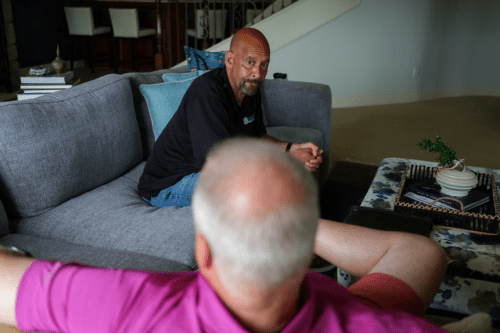
Everyone seems to be more paranoid lately, and that helps Thurman’s small business. His sales surged after the pandemic hit and have climbed steadily since. Sure, the technology has gotten cheaper, but Thurman is troubled by what he senses is driving much of the demand: Americans’ growing preoccupation with the specter of deadly threats.
They fear burglars, gangs and child predators. They believe crime is rising, even in places where it’s dropping, which tracks with what surveys have found nationwide. Over the last three years, the number of people who reported deteriorating safety in their area has spiked, especially among Republicans, though crime ebbed and flowed well below the bloodier levels of the 1990s. Gun purchases soared to record peaks. The home security industry boomed.
What Thurman fears: paranoia that encourages snap violence. Paranoia that, when he approaches a home for the first time, even with a meeting on the calendar, has him scanning where to “duck and dive” in case someone opens fire.
“People with their fingers already on the trigger,” Thurman said — like the 84-year-old White man who shot a Black teenager one April evening in Kansas City after the boy rang his doorbell by mistake. Four “wrong turn”shootings made national headlines that month, and Thurman, who is Black, understood that in too many neighborhoods, especially the safest-ever ones, minorities were more likely to be perceived as suspects.
He has felt that apprehension while visiting new clients, who sometimes forget they’ve booked an appointment. For a few tense seconds as he approaches their door, Thurman is just a stranger.
“I had a guy knock on my door at 3 a.m.,” O’Dell tells him.
That was at his old house, the one not fortified by gates. O’Dell had walked to the front door in his underwear and saw an elderly man who appeared to be disoriented. He called the police.
“It could have been a lot worse for him,” Thurman said.
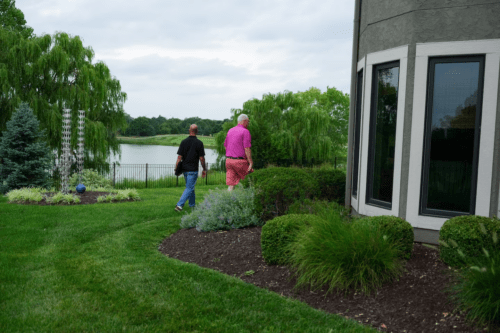
****
How to have these talks?
Thurman’s “no-obligation security reviews” put him on the road about 90 miles each day and often veer into conversations about politics or the state of the country, which come up when people discuss what scares them. Their fears, he noticed, are often influenced by the news they watch, the social media they consume, the politicians they support.
Thurman, 59, tries to stay neutral. He tells clients that he’s voted for Republicans and Democrats. He recites facts gathered over 13 years in this business: Criminals seize opportunities — an unlocked door, an open window, an empty-looking house without cameras — and most of the time, like kitchen mice, they’d rather not run into you.
“Even if you don’t buy anything from me,” he says, “I hope you feel safer.”
His approach began as a business strategy. Be the honest salesman, the ethical salesman, not the salesman who hinted that the neighborhood was going to hell. Telling clients they didn’t need Fort Knox, even when they requested it, lost him sales, but sticking to the truth seeded trust, which usually led to referrals.
Then faith in the government and the media waned. Suspicion of others seemed to skyrocket. A New York woman was shot dead when she pulled into the wrong driveway. Two Texas cheerleaders were shot after one got into the wrong car in a supermarket parking lot. The Kansas City teenwas shot after mixing up NE 115th Street and NE 115th Terrace, and the homeowner charged,Andrew Lester, told police he’d been “scared to death” despite having surveillance cameras.
What had Lester’s security salesman told him?
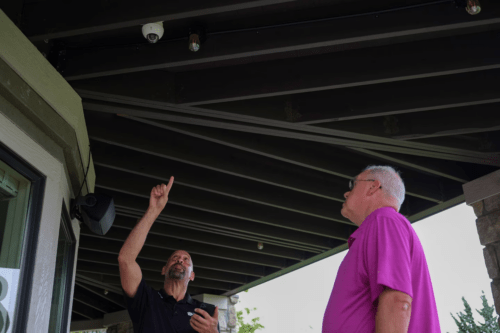
As a child in Nebraska, Thurman, the son of a Harlem Globetrotter and a church secretary, had been the only Black kid in his class and learned early his own set of survival skills: Be the top student. Be the peacemaker. “I thought, well, if anybody wants to know what an African American is like,” he said, “I have to be that example to erase all the stereotypes.”
When a friend used the n-word, he blamed the culture that normalized racist language, not the boy who probably grew up hearing it.
“You had to develop a thick skin and you had to be forgiving,” Thurman said.He extends that grace to clients — even if they have a Confederate flag on the wall, like the man who ended up passing along his number to three buddies.
He met O’Dell years ago after the real estate agent sold a house to a woman who hired Thurman to handle the security. O’Dell, a self-described “fiscally conservative moderate,” didn’t dwell on crime rising or dropping as the two men stepped outside into the July humidity. Mostly, he mulled his own vulnerability.
“The older you get, there’s this sense of not being able to protect yourself,” O’Dell said, which is why he wants to know who or what is on the property at all times, come deliveryman or deer.
“I’d be willing to make a $5,000 to $10,000 investment,” he said.
“Dan,” Thurman said, “I’d have trouble billing you over $5,000.”
****
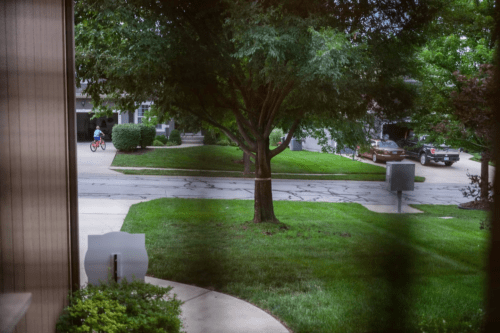
That afternoon, Thurman drove to another no-obligation security review in another Kansas City suburb, where Kelli Cox, 45, was planning to build a pool in her backyard.
“I’d like to get the cameras up soon,” said Cox, handing Thurman the blueprint, “before the workers start.”
Not that she had a problem with the workers. They were simply people she didn’t know in a world where headlines like “Teenagers killed in double homicide” popped up on her news feed and someone had just posted on the neighborhood Facebook page about a “suspicious man” in a “white unmarked van.”
“Parents today, we have so much more to be protective about,” said Cox, who retired from the Kansas City Fed to raise her two boys and a girl.
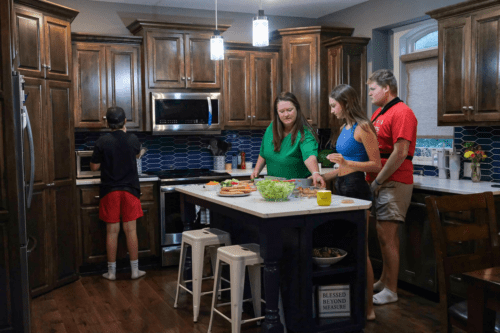
She’d struggled to lower her guard since her 15-year-old daughter’s last dance competition in central Florida. The heavy police presence startled her, and rumors swirled that human traffickers around Orlando were targeting children.
“I used to let her wander freely with her friends,” Cox said. “But after hearing that, I didn’t let her out of my sight.”
The worry followed her home, where Cox bought a tracker for the car Emma will drive once she gets her license, and Thurman delivered his pitch.
“We can get you a camera with motion-detector lights on steroids,” he said, pointing to her second-story deck:“One right up there.”
“I like the idea of having two better,” Cox replied.
****
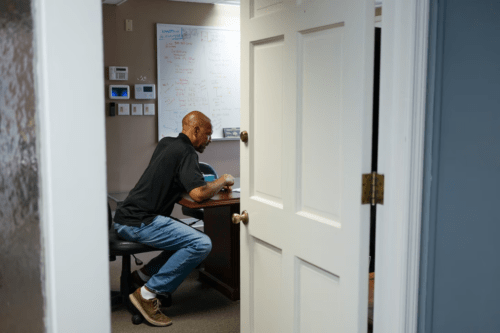
He doesn’t blame people for being scared. Look at the news, the popularity of True Crime podcasts. Look at the mass shootings, the rhetoric about America’s cities burning. When imaginations run wild, at least he can sell a dose of reality: a live stream of what’s actually happening in your yard.
In greater Kansas City, where Thurman’s team of five manages about 1,800 clients, violent and property offenses since 2020 had actually sagged, but homicides ticked up and auto thefts ballooned. Over the past year, his income finally surpassed what he’d earned at a telecom giant before burning out. His big splurge: Taking the entire family — three grown kids and three grandchildren — to Disney World.
He called ahead before visiting Joe Howard, a 64-year-old retired police officer and one of his top referrers, whose wife had just been discharged fromthe hospital. Thurman’s truck was in the shop, and he didn’t want to surprise anyone with his white rental Jeep.
“God answered our prayers,” Howard said as they settled inside. “She’s on the mend.”
Howard keeps six guns at home and runsa neighborhood watch page on Facebook, where he’d pinned a copy of Thurman’s business card.
“We’ve got a surge in crime, and it’s not going to slow down,” he said, easing into his leather massage chair. “It’s prophesied in the Bible — not to bring religion into it, but you know I’m a Christian — and it does say, in the last days, which I believe we’re in, that violence and wickedness and lawlessness will increase.”
Like drag queens “grooming” children, he said, and people with “criminal backgrounds” crossing the border.
Thurman listened silently on the floral couch.
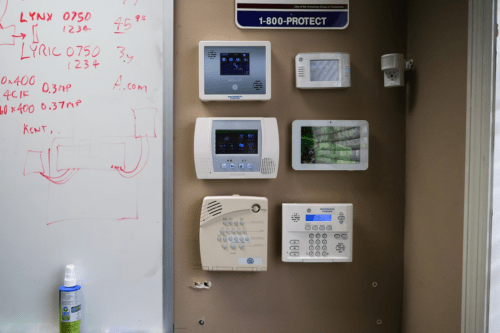
Someone had tried to steal a motorcycle trailer recently from a neighbor’s house, Howard continued. Once, he’d proposed buying some four-block-range walkie talkies that shifts of volunteers could use to watch for criminals. Few were interested.
“They’ve never been victims of crime,” he said. “They don’t know how easy it can happen to anyone at any time at any location.”
Thurmanhad mixed feelings about the idea. The risks of having potentially armed lookouts outweighed the benefits. What would be safer for everyone, he offered, was the deterrence strategy: doors locked, lights on, cameras up.
Howard prefers to carry his .45 pistol everywhere, even if he’s only running to Walmart. “I’m just grateful that we can use deadly force to protect ourselves in Kansas,” he said. “Stand your ground. The castle doctrine.”
If someone trespasses onto his property, he’ll take aim. Yet as a Christian, he said, he won’t shoot anyone who isn’t trying tohurt him.
“But the thing is,” Thurman said, “you are trained, rational, calm. I don’t know what percentage of the population is. But I know there is a percentage of the population who is …”
“Itching to do it,” Howard interjected.
“Oh my God, yes,” Thurman said. “Just looking for an excuse.”
John Harden in Oakland, Calif., contributed to this report.
